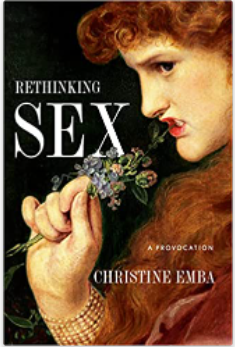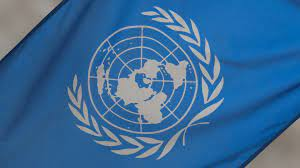I apologize for the virtual pages here being so quiet as of late. Although I think we both still have the state of mind where thoughts we encounter are formed in our own minds in terms of blog posts, the time for actually writing down thoughts as of late has been sorely lacking. And additionally, as I get older, I become more hesitant over whether the world really needs to hear my thoughts expressed. Some of this is probably legitimate prudence. Many of the opinions I felt the need to express fifteen or twenty years ago were, arguably, half baked in the way that the thinking of people in their twenties so often is. And yet that can also be overdone to the point of self silencing. That too is an excess. There are things worth saying.
In a sense, this relates to the book I'd like to discuss.
I read Washington Post columnist Christine Emba's book Rethinking Sex: A Provocation because I was intrigued by the flurry of interviews with her that were popping up on blogs and podcasts that I follow. A key thing that intrigued me was that it seemed like Emba's project was essentially reinventing something rather like a Christian sexual morality, based on Aquinas's definition of virtue as willing the good for the other, and yet I couldn't tell from the various interviews whether she was an active Christian doing this as a sort of intellectual deep cover operation, or if this was a fascinating case of convergent evolution where she was arriving at these old ideas from a freshly blazed path.
Part of the answer to my question was right in the introduction: Emba grew up Evangelical and in college converted to Catholicism, though she also alludes to a crisis of faith which led her to abandon some of her previous moral stands on issues relating to sexuality. Clearly there's some degree of Catholic intellectual influence in the way she's sought to attack her problem.
And what is that problem? Emba seeks to address a mainstream culture of sexual morality in which "anything between consenting adults" is pretty much the start and finish of moral analysis when it comes to sexuality. The view she seeks to rethink is also one in which sex is simply a bodily activity without any inherent meaning other than that others shouldn't do things to our bodies without asking. Thus, since sex is enjoyable, and people like pleasure, it should, according to this view, be perfectly acceptable to have sex with someone you don't have any particular emotional or friendly attachment to, and enjoy that sex while not forming any longer term entanglements which complicate one's life.
Emba suggests instead that sex has meaning, and that it is not unreasonable for people to feel attached to those they have sex with. She also argues that consent should be seen as the minimum, not that totality, of sexual morality. Rather, she argues that virtuous sex is sex which takes into account the good of the other, not just whether they are willing to consent to it. Along the way, she notes things such as that men and women often relate to sex differently, in part due to their biological differences. And that this can lead to things which should be thought of when considering the good of the other. For instance, she says that women often consent to have sex in an otherwise casual dating relationship because the man seems to expect it and she hopes that over time he will come to want a more committed relationship with her. The result can be a years long relationship which never actually becomes more committed, but after which the women finds herself not only dealing with the emotional difficulties of breakup but also that much further from her desire of settling into a committed relationship in time to have children.
The book is well written and observed, and Emba is thoughtful in her approach to fraught moral issues. One hopes that for people living in the sexual world she describes, a book like this could open a view into another way of thinking about these important human issues.
And yet, to some extent, it was a distancing and depressing read for me. In part this is because it drives home just how lost much of the world is on the basic human issue of forming relationships and families. The particular world that Emba comes from and is addressing is that of graduates from elite colleges living out their upwardly mobile lives in one of a few urban centers, and having been influenced by the particular sexual culture preached through talks on consent and sex positivity in those environments. But there's a more down market version of these same problems which affects more people, though they may talk about it in different terms. Even in a world in which dating apps tantalize with the possibility of browsing thousands of potential partners, the data on people in their 20s and 30s suggests a culture in which fewer people are forming relationships and even less are getting married.
So the world described is simply not an encouraging one. But beyond that, it's a somewhat depressing read in terms of where we are in our post Christian culture. After all, to a thoughtful Christian the idea that virtuous love is desiring the good for the other is not alien. And Christianity has applied these principles to relationships and sexuality for two thousand years. And yet, for a great many of those who most need this message in our culture, to package these insights in the form of actual Christian morality is to make it undesirable. Arguably, one of the reasons Emba's book is new and fresh and perhaps likely to reach some new people is that it is not phrased in terms of "we should live our lives as God intended us to". Even as, for a Christian reader, it seems like the author does a good deal of work to get to a very tentative and somewhat watered down version of basic Christian moral rules, it is probably because she is inventing these rules over from scratch that it is getting the attention that it is. Actual Christian morality has, by many, including some Christians, already been rejected simply out of bad associations with Christianity and its members and history. And that is a very unfortunate thing for people all round. After all, God did not give us the law to make life difficult for us but as a gift to make us thrive.
What to do in the face of this situation as a Christian? We're certainly not going to get the same kind of book launch treatment and congratulations for thinking through something novel. But we can work to live out our faith virtuously, and hope that in time that will provide us and others with the path to living as God meant us to.



